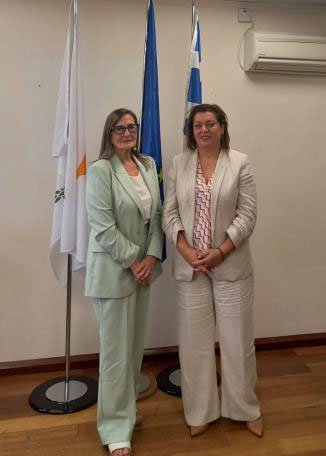
Corruption, a Global Problem of Patriarchal states
February 23, 2022
Διάσκεψη Κύπριων Γυναικών για το Μέλλον της Ευρώπης
February 23, 2022Maria Hadjipavlou
Not too long ago politics and women were two terms incompatible. Thanks to numerous women’s struggles and feminist academic literature we have made as societies-I refer to the continent of Europe-many changes in women’s rights one of them not viewing Politics as an exclusive domain for men. It is important, however, to ask for which men and which women? But have we really achieved that much in the span of more than two and a half centuries when globally only 25.5% are women in the state legislatures and at the European Parliament it stands at 38.9%?
The latest European Institute of Gender Equality (EIGE) Index informs us that it will take 60 years more to reach gender equality/parity in the EU member states! What does this tell us about political representation and meaningful, functioning democracies? (In political-social activism women have historically always been present but rarely recorded in official histories)!
For our information in the latest 2021 of EIGE Index the Republic of Cyprus has scored 54 points out of a 100 when the EU average is 68 points. Cyprus best performance was in the Health domain and the worst in the domain of Power, that is we got only 33 points – the EU average is 55- and it ranks 24th; on issues of economic decision-making Cyprus also ranks 24th with only 22.9 points. In the European Parliament we score 0 women; in the national parliament after the latest government reshuffle last year we have 8 women out of 56 seats that is 21.4%. In the Turkish Cypriot recent parliamentary elections 11 women were elected out of 50. For the first time in 60 years we have a woman president of the Parliament. Only four European EU states have women Prime Ministers- Denmark, Finland, New Zealand, Iceland.,
I will not go on giving statistical data. We can easily find them on internet. The important thing is to reflect and discuss what lies underneath these numbers with regard to gender inequalities? After last election results in the Greek Cypriot community some highly visible women’s comments made to the press expressed disappointment and attributed the dismal results to gender stereotypes and social prejudices etc. Fair enough, these are indeed obstacles and not the only ones. But most important in our analysis is to ask where these stereotypes and prejudices and obstacles rooted are? And what needs to be done? Why the persistence of the male dominated social and political culture in our society? I propose to re-examine the structures and the values that sustain patriarchy and exclusionary politics After all, for political institutions to be democratically legitimate and responsive to all citizens, they must be inclusive of the plurality of groups that exist within the population. This requires greater representation of women in national parliaments as women make up half of the world’s population. This applies to the European Parliament and all other EU institutions. This practice will also help societal perception to eliminate the sharp binary between the private/public spaces and develop a Third space where the two can interact and be fluid. After all, the ‘personal is political’ as the feminists of the second wave struggled for, and that is why we have all the laws against sexual harassment, rape and gender-based violence as well as our right to own our body, etc.
Our recommendation is for both the national institutions and the EU to pay more attention to the diversity of the people’s interests and needs as they are shaped by different groups of women, different groups of men, minorities, LGBTQI groups etc. In other words introduce the concept of intersectionality in the electoral lists and appointed posts. Gender equality intersects apart from gender also with ethnicity, race, age, sexuality, physical ability, class, etc. I believe the EU can promote this as one of its recommendations and actions to the national governments, political parties, civil society and the media-especially this later that recently with not much consideration uses sexist and racist language and vulgar devaluing representation of women and sometimes of men too.
In our context one of the practical ways could be the introduction of quotas in elections to represent the diversity and complexity of our society and make gender equality issues as part of the election campaigns. Can we legislate gender quotas in order to improve gender balance and do away with it once we achieved it? Many EU states have followed this practice.
Now, I want to answer the question why women and what difference their presence would make in decision-making centres? Is there a ‘feminine style’ in women’s political discourse and if so what are its characteristics? How is Power and Politics framed by women and feminism? Research and many academic studies and publications (2019) have informed us that there is a ‘feminine style’ in women’s political discourse and its features are noted as follows:
1. They base their political judgements on concrete lived experience
2. They value inclusivity and the relational nature of being
3. They Reconceptualise Power as capacity to get things done and to empower others as opposed to the patriarchal view of Power as a rare resource, competitive owned by a small elite heterosexual men usually-thus in the patriarchal understanding Power is perceived as domination over others and a limited resource.
4. They approach policy formation holistically and they consider all perspectives and needs
5. They move women’s issues to the forefront of the public agenda not as opportune issues
Other studies speak about women politicians being more empathic, compassionate understanding and in solidarity with other oppressed groups and the grass roots. Needless to say, there are also some men who do use this style or some of these features in their discourse. And not all women use this style either, for ‘not all women are feminists’, as was also recently mentioned at an EU forum.
Another research informs us that in parliamentary committees when women chaired, the decisions were taken faster and more efficiently followed by implementation.
Women broaden the agenda on social issues including education, health, children’s and minority rights and welfare for the elderly, issues of poverty and unemployment, corruption, etc. and establish dialogue with civil society as well as work across party-lines.
A final point- Politics for feminists includes the broadening of the political in a dialectical critical relationship with the institutions so as to challenge creatively those discriminatory norms and policies that restrict men and women’s full development and thus develop an alternative political ethos and values to govern the power relations at all levels of decision-making. Politics is what we do and experience daily. Politics does not concern only the politicians or elected representatives but each one of us as citizens and actors for we each are impacted by political decision in our everyday living from our private to our public lives, from the rights and the compensation we receive when we get divorced to the taxes we pay as a working woman/man, to our views on issue of war, peace and security.
Studies have also shown that few women seek political office with the intention of representing women’s interests and concerns per se. Why? To avoid being perceived as too narrow in their concerns and that will not adequately represent all the people! This needs to change because women’s concerns are social issues that concern all the society.
On the whole, women's active political participation can contribute additional tangible gains for real democracy, including greater responsiveness to citizens’ needs, increased cooperation across party and ethnic lines, and a more sustainable ecologically viable future.
Some further suggestions:
1. Use of intersectionality as an analytical tool in researching women’s’ and social issues affecting different constituencies in the EU. It is important to examine if there is enough diversity represented in all levels and committees such as women from ethnic minorities, LGBTI women, older and younger women with disabilities, Roma? Which societal groups are represented and which are excluded and why?
2. Re-visit women’s and men’s contribution to build a feminist Europe which means elimination of all forms of discriminations and binaries –this can be done with information campaigns centrally from Brussels and nationally, for ‘gender equality’ begins at home as feminists advised and unequal power between men and women leads to discrimination, violence, injustices and prevents the full advances of both sexes.
3. Build communities of knowledge (publications) about women political leaders and others who promoted changes in both their societies and in the EU politics. The need for good role models.
4. Promote women’s achievements, challenges and contributions toward social and political change for the common good.
5. Build channels of communication between EU parliamentarians and the civil society and grass roots so that people’s political participation in parliamentary elections will increase and see the value of their vote in a meaningful way.






